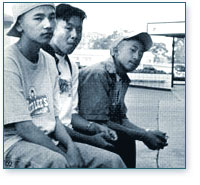|
K-12 Education
 While many Southeast Asian American students have overcome substantial obstacles to attain high levels of achievement in school, others have more modest levels of achievement, including those who have dropped out of the K-12 system. This can be attributed to a variety of factors, including the lack of culturally responsive curricula or language support in school, racism expressed by both adults and peers, family poverty and the resulting economic pressures to engage in paid employment, and caretaking responsibilities for younger siblings or older disabled adults at home. Involvement in street crime and gangs by many Southeast Asian American youth in cities across the U.S. reflects, in part, the lack of engagement and support they feel in school. For example, the effort to have an inclusive curriculum that includes the Southeast Asian American experience, even in districts with high numbers of these students, is still a struggle. While many Southeast Asian American students have overcome substantial obstacles to attain high levels of achievement in school, others have more modest levels of achievement, including those who have dropped out of the K-12 system. This can be attributed to a variety of factors, including the lack of culturally responsive curricula or language support in school, racism expressed by both adults and peers, family poverty and the resulting economic pressures to engage in paid employment, and caretaking responsibilities for younger siblings or older disabled adults at home. Involvement in street crime and gangs by many Southeast Asian American youth in cities across the U.S. reflects, in part, the lack of engagement and support they feel in school. For example, the effort to have an inclusive curriculum that includes the Southeast Asian American experience, even in districts with high numbers of these students, is still a struggle.
A Challenge for Parents
Parents who speak limited English or are illiterate, having had limited
or no schooling, have a difficult time helping their children with
their homework or attending teacher-parent meetings. Their
unfamiliarity with the benefits of an education makes it difficult to
support their children’s educational aspirations, especially if their immediate need is for their sons to contribute to the family income, and if they expect their daughters to fulfill only the domestic roles of wife and mother. Without mentorship or parental support, many drop out of school. Community members have formed ethnic parent support groups to inform parents about the functions of the educational system and have advocated for parental needs, such as translation of notes from teachers to parents into ethnic languages.
|
Continued on page 2
|
<< Back |
[1] 2
|
Next >> |
|


 While many Southeast Asian American students have overcome substantial obstacles to attain high levels of achievement in school, others have more modest levels of achievement, including those who have dropped out of the K-12 system. This can be attributed to a variety of factors, including the lack of culturally responsive curricula or language support in school, racism expressed by both adults and peers, family poverty and the resulting economic pressures to engage in paid employment, and caretaking responsibilities for younger siblings or older disabled adults at home. Involvement in street crime and gangs by many Southeast Asian American youth in cities across the U.S. reflects, in part, the lack of engagement and support they feel in school. For example, the effort to have an inclusive curriculum that includes the Southeast Asian American experience, even in districts with high numbers of these students, is still a struggle.
While many Southeast Asian American students have overcome substantial obstacles to attain high levels of achievement in school, others have more modest levels of achievement, including those who have dropped out of the K-12 system. This can be attributed to a variety of factors, including the lack of culturally responsive curricula or language support in school, racism expressed by both adults and peers, family poverty and the resulting economic pressures to engage in paid employment, and caretaking responsibilities for younger siblings or older disabled adults at home. Involvement in street crime and gangs by many Southeast Asian American youth in cities across the U.S. reflects, in part, the lack of engagement and support they feel in school. For example, the effort to have an inclusive curriculum that includes the Southeast Asian American experience, even in districts with high numbers of these students, is still a struggle.